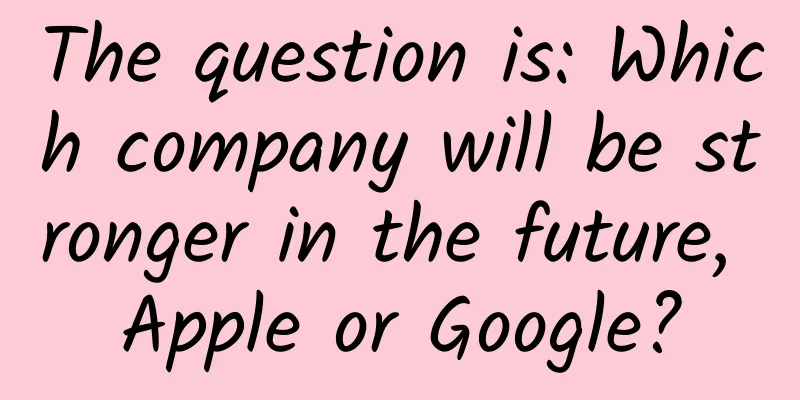The question is: Which company will be stronger in the future, Apple or Google?

|
Recently, former Apple CEO John Sculley said that he believes that the next major innovation in the field of technology will most likely not come from Apple, but from other companies such as Google. He believes that Google is more likely to make major innovations in the future than Apple and other companies, and Apple is still on the old path and is just constantly improving existing products. But the author would like to follow this point and discuss it as divergently and in detail as possible through his own thoughts, that is, does the future belong to Google or Apple? Android: What doesn't kill me makes me stronger The future confrontation between Apple and Google will inevitably depend on the attractiveness of iOS and Android operating systems to developers and their subsequent development trends. In fact, there are some historical disputes here. Eric Schmidt, former CEO and current chairman of Google, served as a director of Apple from 2006 to August 2009. At that time, Schmidt had two identities: he was both the CEO of Google and a director of Apple's board of directors. After Google spent $50 million to acquire Android in 2005, it has been developing Android prototypes. Of course, the Android prototypes we saw later were not much different from the later iPhone full-touch screen machines. After that, Google's Android series of mobile phone siege strategy developed rapidly. Of course, this made Jobs very angry. He was naturally very clear about Schmidt's secret role in this. Jobs and Schmidt also turned against each other because of this. Jobs later said: "I will use my last breath of life and will not hesitate to spend the $40 billion that Apple has in the bank to correct this. I want to destroy Android because it is a stolen product. I am willing to start a nuclear war against it." But with Jobs' death from cancer, Apple under Cook's leadership is obviously unable to fulfill Jobs's wish to destroy Android. From the perspective of the book "Antifragile", Android has a strong anti-fragility in the long-term battle with iOS. What doesn't kill me makes me stronger. This sentence is also suitable for Android. Today, Android has accounted for nearly 80% of the global smartphone market. Google now uses Android as the underlying core of the system to widely connect smartphones such as mobile phones, cars, wearables, home appliances, notebooks, etc. with related smart hardware. This is the core of Google's connection to everything. The future of iOS depends on the sales of iPhone hardware. Android can find profit points through software services. Let's look at the layout of the software ecosystem of the two. The author believes that the advantage of Apple's software ecosystem is only relative, not absolute. It depends on who the opponent is. Compared with Samsung and Nokia at the time, Apple certainly has an absolute advantage in software layout. But compared with Google, it may be slightly inferior, and the gap will widen in the future. Apple's closed system determines that when it comes to software layout, it cannot neglect hardware innovation. In fact, users' expectations for Apple's hardware innovation are higher than software innovation. Because fashion sense and high-end brand tonality must be the first and most intuitive reflection on Apple hardware. Apple's brand premium requires Apple to maintain its high-end product positioning for a long time. For enterprises, it is difficult to maintain a high-end brand while also improving profitability by reducing costs. Investing in R&D resources to launch hardware products with higher profits and higher performance is an effective means to maintain Apple's competitiveness. Then Apple's weakness lies in that as global smart phone technology matures, the marginal effect of hardware technology decreases, and smart phones begin to shift to making money from value-added services of software. Under the circumstances where the profit space of hardware is compressed, Apple needs to maintain high prices and high profits for hardware for a long time. This difficulty can be imagined. Google is different. Google extends its internet platform and software layout to hardware. Software, internet services and platform construction are its genes. The longer the software and internet services take root and the more perfect the ecological chain is, the stronger its core advantage will be. We have seen that Google's Android operating system has almost connected to the hardware that Google can connect to, including mobile phones, cars, wearables, home appliances, notebooks, etc. We have seen that at the I/O Developer Conference, Google released eight new products, including; Android Wear smart watch system, car system Android Auto, Chromecast TV stick and Chromebook, as well as the new generation operating system Android L and Android TV application, Google Fit health management platform. Google can connect everything through Android, and through the big data advantage of Google search engine, control various data based on user hardware usage and convert them into better user experience and better meet user needs. Google's advantage over Apple is that it does not rely on hardware for profit. For example, based on the Android One platform launched for low-priced mobile phones, it is said that Google can reduce the price of current Android phones to around $100, which will inevitably pull those who are still using feature phones into the Google platform. For Google, the Internet and software ecology are its inherent advantages, while hardware is auxiliary. Google's Internet genes determine that it does not rely on hardware for profit. By relying on the layout of connecting everything, Google can then find profit points for software value-added services. Therefore, as the subsequent Android experience becomes more and more perfect, under the dual pressure of Moore's Law and the improvement of Google's Android system, the price of Apple's high-end mobile phones will continue to be impacted, and Apple may face the same crisis as Samsung. We have seen that after Samsung's current smartphone hardware has developed to the top, the advantage of horizontally integrated hardware supply chain has gradually disappeared, and Samsung's brand value has also begun to shrink. When the hardware experience is similar, users will buy a domestic mobile phone with a higher price and hardware configuration. This is also the reason why domestic mobile phones can strongly snatch Samsung's market share in the low-end market with their cost-effective advantages. In the future, if Apple's hardware performance continues to lack innovation, while the Android system experience becomes more and more perfect, Apple will face the pressure of external competition and its brand premium may shrink. From another perspective, in the future, what reason do users have to buy an Apple phone that is expensive but has a similar software and hardware experience to Android phones? iOS vs. Android: The open ecosystem is more stable and resistant to risks, and there is more room for imagination in the future Apple's high-end hardware attributes determine that it must rely on hardware as the biggest source of profit. From the beginning, Apple's founder Steve Jobs adopted a relatively closed but relatively complete ecological chain layout. Apple is born with the gene of hardware innovation. The iOS system and software layout are the core connection points between hardware and users. Many people say that iOS is Apple's core advantage, surpassing Android in terms of system experience, but as time goes by, Android will inevitably be accompanied by the improvement of the system and the continuous improvement of user experience. We can see that this year Google released a new generation of Nexus 6, which is basically the top configuration, and with the Android L released with it, it can be seen that Google is clearly trying to block Apple's large-screen iPhone 6 Plus. Zheng Jun, an industry insider, currently believes that: "Since Android 4.0, Google has deliberately slowed down the previous unrestrained and messy development speed and started to settle down to create the actual experience of Android. The year before last, it rebuilt a unified Play Store, last year with Android 4.4 launched a new operating mode ART, and this year through Android L unified application interface design, we can see that Google is actually serious in this regard, trying to prove that the Android experience is not necessarily worse than the iPhone." The author also noticed that Google Android has a group of younger brothers behind it. Most of the software developers in the world and almost all the smart phone manufacturers in the world except Apple (Samsung, Xiaomi, HTC, OPPO, Motorola, etc.) are dependent on the Android system. It can be said that Android has a group of younger brothers behind it to fight against iOS. The overall stability of the Android system lies in the fact that many mobile phone manufacturers are dependent on the Android operating system. Even if the main Android brand Samsung mobile phone declines, there will inevitably be other manufacturers (Xiaomi, etc.). Therefore, the total energy and total strength of the hardware manufacturers in the Android system can remain constant and basically balanced, which also maintains the stability of Android users and software developers, and thus ensures the stability of Android. The general view in the industry is that iPhone-based phones have been lacking innovation since the iPhone 5, and the launch of large-screen phones with the iPhone 6 is considered a follow-up. The continued lack of innovation in hardware technology and craftsmanship will inevitably frustrate fans' expectations. If the iPhone hardware continues to be mediocre and sales decline in the future, which phone will the iOS system be attached to? In other words, Apple's smooth and easy-to-use iOS system is another killer feature of Apple besides hardware innovation, but the closed nature of the iOS system determines its high dependence on the iPhone series of phones. Therefore, the popularity of iPhone hardware determines the effectiveness of its operating system and software layout. In fact, as a fashionable technology company, Apple's lack of innovation in hardware craftsmanship will greatly reduce its charm. In the Steve Jobs era, the brand premium brought by hardware innovation and process design could compete with the entire Android system. After Steve Jobs, it is hard to say whether the gradually mediocre Apple can still withstand the pressure from Google. In other words, behind Google is a powerful open ecosystem of integrated software and hardware, while behind iOS is a closed ecosystem of integrated software and hardware. The open ecosystem of Google is also determined by the open gene of Google's Internet. From the analysis, it can be seen that the health of the open ecosystem is better than that of the closed empire. Acquisition strategy: Google is exploring the next technological innovation and entry point, while Apple is integrating and strengthening its existing advantages Looking at the acquisition strategy, Google takes Internet software, platform, and network services as its core business and then extends to hardware layout, while Apple takes hardware as its core business and then extends to software ecosystem layout; while the latter takes Internet software, platform, and network services as its core business and then extends to hardware layout. In fact, the author has talked about this point of view before, that is, the layout from hardware to software is more risky. This article will also touch on this point of view. First of all, what are the highlights of Google's layout in the hardware field with software and Internet services as the core in recent years? In 2014, Google spent $3 billion to acquire Boston Dynamics, a robotics engineering technology company, $500 million to acquire Deep Mind, an artificial intelligence company, and $3.2 billion to acquire Nest, a smart home company. Google's acquisitions have even expanded to biological companies and solar companies. In addition, Google has released the Android Wear system for wearable devices (smart watches). We can see that Google's acquisition strategy involves areas including robotics, augmented reality, artificial intelligence, and the Internet of Things. The intention is also very clear: to continuously explore the next technological innovation revolution and entry point. Let's look at Apple's recent acquisitions. In 2014, Apple's acquisitions included PrimeSense, an Israeli 3D sensing technology company; Topsy, a social media analysis company; Broadmap, a map application company; Catch, a cloud note application company; WiFiSlam, an indoor navigation technology company; Locationary, a Canadian map data company; HopStop, a traffic navigation service application company; Passif Semiconductor, a communication chip developer; Matcha, a video recommendation website; Embark, a bus application developer; and AlgoTrim, a mobile data compression company. It can be seen that most of the companies that Apple is involved in acquiring are small and beautiful companies in the software field. Whether it is the acquisition of video websites, social media companies, map application companies, or streaming music service Beats, Apple's acquisitions are all to make up for its own business shortcomings in social, map, music services, etc., and to strengthen the content software ecosystem to promote hardware sales and market share. Then all these businesses will be integrated into the closed iOS ecosystem, that is, integrating existing advantages. There are inevitable reasons for this. Apple relies on hardware as the core of its profit. Bold attempts at technological innovation in hardware often have a ripple effect. When user needs (such as Apple's large-screen mobile phones) are known, sustaining innovation is relatively more stable and safe. At present, the iOS system is relatively complete, so Apple's acquisition strategy is relatively cautious and feels like walking on thin ice. In addition, under Moore's Law, when hardware development reaches the top, Apple will inevitably be driven to build a powerful software ecosystem to compete with Google. This is an inevitable move to follow the trend. This can be reflected in Apple's current situation. Apple currently brings more sustaining innovations rather than disruptive innovations. We can see that the 20 nanometer CPU of iPhone 6 is combined with a larger battery to improve battery life. For iOS, Apple has demonstrated a series of software centers that integrate health and fitness data. iPhone 6 Plue also adds support for optical image stabilization. The new iPad has a thinner body (iPad Air 2 is 18% thinner than the previous generation), a better screen (iPad Air 2), and a better processor (using Apple's A8X processor). The iPad mini 3 has not changed in appearance, screen, or configuration. The only highlight is the addition of Touch ID. Apple is proficient in sustaining innovation. Making a fuss about bringing one or several new features to each new product at the press conference has become an inherent idea of Apple's recent press conferences. We can see that the iPhone 6 and the new iPad do not have many eye-catching technical innovations in hardware, but more minor functional improvements. Maintaining innovation means maintaining the status quo, which is undoubtedly how Apple's leader Cook positions himself. In the Cook era, Apple's strategic core has gradually changed, that is, the closed system that continues to be built around iOS. Everything Apple does is to make the closed system of iOS more stable and the capital market recognize Apple's continued profitability rather than exploring the next revolutionary technological innovation. Conclusion Back to the previous topic, if Apple's hardware continues to lack innovation, while the Android system and software ecosystem experience is becoming more and more perfect, Apple's ecosystem will become fragile, which will determine whether software developers and users will turn to Android or iOS. It can be seen that Apple is undoubtedly more stressed and anxious than Google in planning the future or the next technological innovation point. The author also believes that one of Google's biggest advantages is that it can keep making mistakes. Because even if it makes mistakes, its basic business with search engines as its profit and strategic core will not be shaken. This logic can also be applied to Baidu's extensive strategic layout strategy for smart hardware in China. Regardless of Google's layout in the fields of smart hardware, future technology, or smartphone hardware, even if there is no harvest, Google's core business in search engines is almost unshakable. From the current point of view, Google's acquisition is similar to a surrounding galaxy-shaped structure, with a moat built on the periphery. After the core base is stable, it begins to expand outward and expand the territory and imagination space. The synergy between various businesses is also very obvious, and basically sorts out the basic model of a grand empire that is difficult to subvert. Therefore, Google's pace of exploring new technologies is more stable and relaxed, and it is not obsessed with the layout of shortcomings, and can have more energy and time to continuously invest in the layout of smart hardware, biotechnology companies, solar energy companies, etc. From this point of view, the next entrance and technological innovation is undoubtedly more likely to be grasped by Google, which has a more stable pace, a more open ecology and a spirit of technological exploration. The wisdom of taking over Android also proves that Google's acquisition has a certain forward-looking nature. The ambitions of both Apple and Google are to connect everything, which is actually in line with the strategy of BAT in China. Relatively speaking, the basis for Apple to connect everything lies in whether the sales of hardware can attract a wider range of users, because Apple hardware is the cornerstone of the iOS system, and the share of hardware users is the basis for the iOS system to connect everything. It is inevitable that the sense of crisis is greater and the anxiety is deeper. As mentioned earlier, the openness of Google's Android system allows the total energy and total strength of hardware manufacturers to maintain a constant and basic balance with the total number of users, while Google connects everything with the Android system as a link. The Internet platform built by Google's search engine serves as a service foundation, which can open technology, services, and users to a wider range of software and hardware manufacturers. Based on its own big data and the Internet's deep-rooted advantages in technology, users, services and platforms, it has more room for imagination to connect everything with future technology. In the future, Google's prospects are more promising. As a winner of Toutiao's Qingyun Plan and Baijiahao's Bai+ Plan, the 2019 Baidu Digital Author of the Year, the Baijiahao's Most Popular Author in the Technology Field, the 2019 Sogou Technology and Culture Author, and the 2021 Baijiahao Quarterly Influential Creator, he has won many awards, including the 2013 Sohu Best Industry Media Person, the 2015 China New Media Entrepreneurship Competition Beijing Third Place, the 2015 Guangmang Experience Award, the 2015 China New Media Entrepreneurship Competition Finals Third Place, and the 2018 Baidu Dynamic Annual Powerful Celebrity. |
<<: Behind Amazon's stock price plunge: continued loss forecasts make the market lose patience
>>: When will WeChat e-commerce, which is fueled by everyone’s contribution, become more popular?
Recommend
Top 50 private domain strategies used by brands!
If 2020 is the first year of private domain, 2021...
How to promote APP on campus by doing activities
1. There are three common activities: booth activ...
How much does it cost for a Leshan merchant to develop a driving school mini app?
WeChat Mini Program is an application that users ...
How much do you know about the history of human use of energy?
1. From Prometheus stealing fire to Suiren drilli...
Google adjusts 3D perception mobile phone project Tango or will develop products
Google has a project called Tango that is working...
Methods for attracting new users through event operations!
In recent years, I have seen many user operations...
Fudan University Liang Yongan: Hardships of Work
Liang Yongan from Fudan University: The Hardship ...
What are the functions of Foshan WeChat blind date mini program? How much does it cost to make a matchmaking app?
Nowadays, the ratio of men to women is unbalanced...
Why do men with impotence often fart? Clinical research gives the authoritative answer!
Recently, the COVID-19 epidemic has reached a cli...
It will rain every day in the future... What is the "cold vortex blue" that dominates the Beijing sky?
Review expert: Ye Haiying, deputy director of the...
Where do domestic goats come from? The answer lies in their Tianshan "brothers"!
The steep cliffs seem like flat ground under thei...
10 open source task management and time tracking apps for Android
[[181824]] The pressures of modern life can somet...
Energy Research Institute: Outlook for China's Energy Transformation to 2024 - Executive Summary
With tremendous efforts, energy transformation ca...
He doesn't exercise for even a second, but his grip strength is twice that of anyone else. Who is he?
Three-toed sloth Image credit: Unslpash Sloths ar...
Disappointing: Apple Watch's sapphire screen is so bad
The low production volume is only one of the reas...





![[Exclusive] DY Empowerment System Star Course](/upload/images/67cc0c77b8079.webp)



